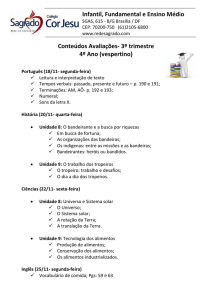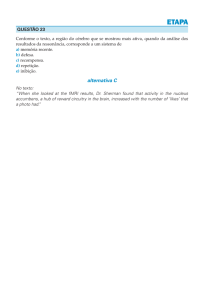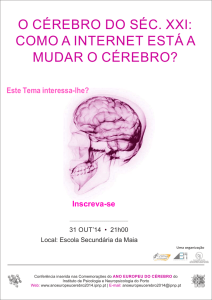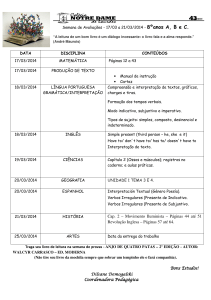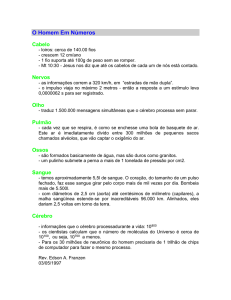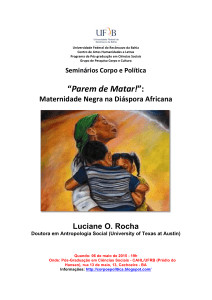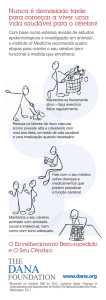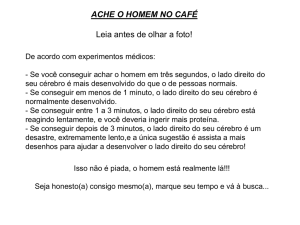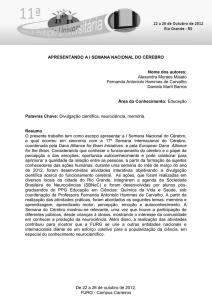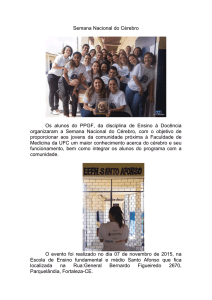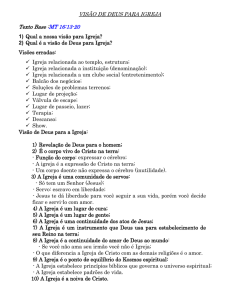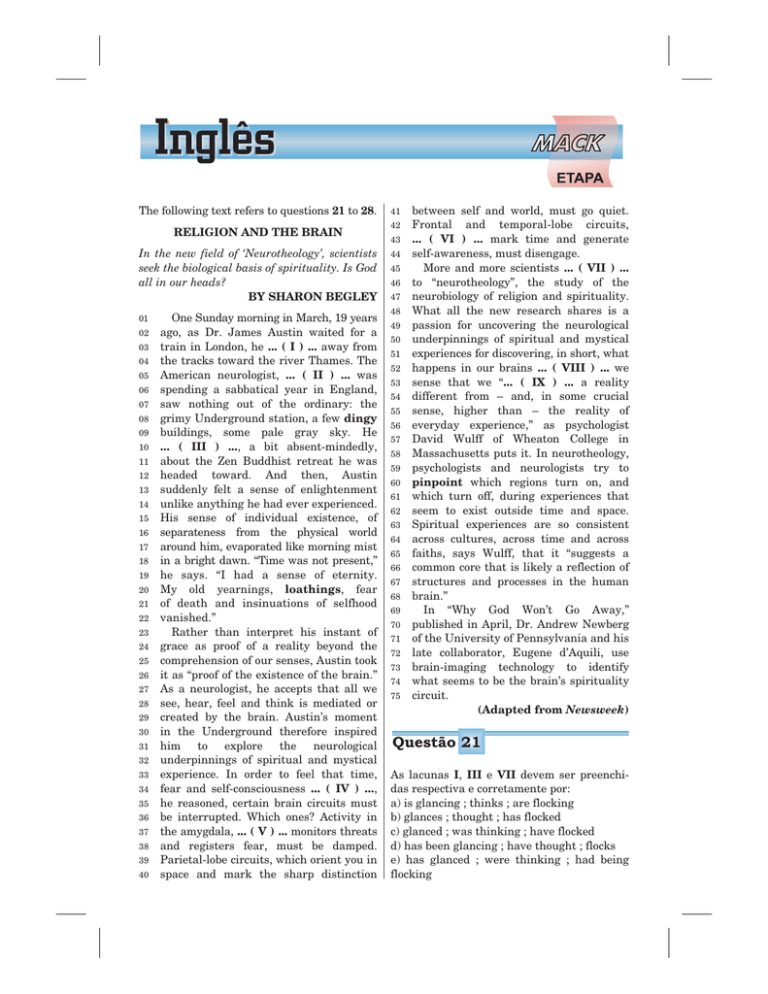
The following text refers to questions 21 to 28.
RELIGION AND THE BRAIN
In the new field of ‘Neurotheology’, scientists
seek the biological basis of spirituality. Is God
all in our heads?
BY SHARON BEGLEY
01
02
03
04
05
06
07
08
09
10
11
12
13
14
15
16
17
18
19
20
21
22
23
24
25
26
27
28
29
30
31
32
33
34
35
36
37
38
39
40
One Sunday morning in March, 19 years
ago, as Dr. James Austin waited for a
train in London, he ... ( I ) ... away from
the tracks toward the river Thames. The
American neurologist, ... ( II ) ... was
spending a sabbatical year in England,
saw nothing out of the ordinary: the
grimy Underground station, a few dingy
buildings, some pale gray sky. He
... ( III ) ..., a bit absent-mindedly,
about the Zen Buddhist retreat he was
headed toward. And then, Austin
suddenly felt a sense of enlightenment
unlike anything he had ever experienced.
His sense of individual existence, of
separateness from the physical world
around him, evaporated like morning mist
in a bright dawn. “Time was not present,”
he says. “I had a sense of eternity.
My old yearnings, loathings, fear
of death and insinuations of selfhood
vanished.”
Rather than interpret his instant of
grace as proof of a reality beyond the
comprehension of our senses, Austin took
it as “proof of the existence of the brain.”
As a neurologist, he accepts that all we
see, hear, feel and think is mediated or
created by the brain. Austin’s moment
in the Underground therefore inspired
him to explore the neurological
underpinnings of spiritual and mystical
experience. In order to feel that time,
fear and self-consciousness ... ( IV ) ...,
he reasoned, certain brain circuits must
be interrupted. Which ones? Activity in
the amygdala, ... ( V ) ... monitors threats
and registers fear, must be damped.
Parietal-lobe circuits, which orient you in
space and mark the sharp distinction
41
42
43
44
45
46
47
48
49
50
51
52
53
54
55
56
57
58
59
60
61
62
63
64
65
66
67
68
69
70
71
72
73
74
75
between self and world, must go quiet.
Frontal and temporal-lobe circuits,
... ( VI ) ... mark time and generate
self-awareness, must disengage.
More and more scientists ... ( VII ) ...
to “neurotheology”, the study of the
neurobiology of religion and spirituality.
What all the new research shares is a
passion for uncovering the neurological
underpinnings of spiritual and mystical
experiences for discovering, in short, what
happens in our brains ... ( VIII ) ... we
sense that we “... ( IX ) ... a reality
different from – and, in some crucial
sense, higher than – the reality of
everyday experience,” as psychologist
David Wulff of Wheaton College in
Massachusetts puts it. In neurotheology,
psychologists and neurologists try to
pinpoint which regions turn on, and
which turn off, during experiences that
seem to exist outside time and space.
Spiritual experiences are so consistent
across cultures, across time and across
faiths, says Wulff, that it “suggests a
common core that is likely a reflection of
structures and processes in the human
brain.”
In “Why God Won’t Go Away,”
published in April, Dr. Andrew Newberg
of the University of Pennsylvania and his
late collaborator, Eugene d’Aquili, use
brain-imaging technology to identify
what seems to be the brain’s spirituality
circuit.
(Adapted from Newsweek)
Questão 21
As lacunas I, III e VII devem ser preenchidas respectiva e corretamente por:
a) is glancing ; thinks ; are flocking
b) glances ; thought ; has flocked
c) glanced ; was thinking ; have flocked
d) has been glancing ; have thought ; flocks
e) has glanced ; were thinking ; had being
flocking
inglês 2
alternativa C
Tradução completa do texto:
A Religião e o Cérebro
No campo novo da "Neuroteologia", cientistas
buscam a base biológica da espiritualidade. Está
Deus todo em nossas cabeças?
Certo domingo de manhã em março, há 19
anos, enquanto o Dr. James Austin esperava
um trem em Londres, moveu os olhos dos trilhos para o rio Tâmisa. O neurologista americano, que gozava um ano sabático na Inglaterra,
nada viu de incomum: uma estação do metrô
suja, alguns prédios lúgubres e o céu acinzentado. Pensava, um tanto distraidamente, no retiro zen-budista para onde se dirigia. E então
Austin subitamente teve uma sensação de iluminação como nada que houvesse jamais experimentado. Sua consciência de existência individual, de separação do mundo físico à sua
volta, evaporou-se como a brisa matinal numa
aurora resplandecente. "O tempo não existia",
afirma. "Senti a eternidade. Os anseios, os rancores, o medo da morte e as alusões de individualidade de outrora todos desapareceram".
Em vez de interpretar seu momento de graça como prova de uma realidade além da compreensão dos nossos sentidos, Austin encarou-o como "prova da existência do cérebro".
Como neurologista, ele aceita que tudo que vemos, ouvimos, sentimos e pensamos é mediado ou criado pelo cérebro. Portanto, o momento de Austin no metrô inspirou-o a explorar os
alicerces neurológicos da experiência mística e
espiritual. Para sentir que o tempo, o medo e o
auto-conhecimento se esvaem, raciocinou ele,
certos circuitos cerebrais devem ser interrompidos. Quais? A atividade nas amídalas, que monitora as ameaças e registra o medo, deve ser
reduzida. Os circuitos do lóbulo parietal, que
nos orientam no espaço e marcam a distinção
clara entre o eu e o mundo, devem se tornar
inativos. Os circuitos dos lóbulos temporal e
frontal, que marcam o tempo e geram o auto-conhecimento devem se desconectar.
Mais e mais cientistas vêm aderindo à "neuroteologia", o estudo da neurobiologia da religião e espiritualidade. O que todas essas novas pesquisas têm em comum é a paixão pela
descoberta dos alicerces neurológicos de experiências místicas e espirituais, pela descoberta,
em suma, do que ocorre em nossos cérebros
quando sentimos ter encontrado uma realidade
diferente e, em algum aspecto crucial, mais
alta que a realidade da experiência diária,
como coloca o psicólogo David Wulff da Faculdade Wheaton em Massachusetts. Na neuro-
teologia, psicólogos e neurologistas tentam determinar que regiões são ativadas e quais são
desativadas durante experiências que parecem
ocorrer fora do tempo e do espaço. Experiências espirituais são consistentes através das
culturas, do tempo e da fé, diz Wulff, o que "sugere um centro comum que provavelmente reflete estruturas e processos no cérebro humano".
Em "Por que Deus Não Vai Embora", publicado em abril, Dr. Andrew Newberg, da Universidade da Pensilvânia, e seu falecido colaborador, Eugene d’Aquili, usam tecnologias tomográficas do cérebro para identificar o que
parece ser seu circuito espiritual.
Questão 22
As lacunas II, V, VI e VIII devem ser preenchidas respectiva e corretamente por:
a) that ; who ; when ; what
b) who ; which ; which ; when
c) when ; where ; that ; whose
d) which ; that ; whose ; where
e) whom ; who ; where ; which
alternativa B
O relativo who é empregado para pessoas, e
which, para coisas.
Questão 23
As lacunas IV e IX devem ser preenchidas
respectiva e corretamente por:
a) is dissolving ; encounters
b) is being dissolving ; are encountering
c) dissolved ; has encountered
d) dissolves ; have being encountering
e) have dissolved ; have encountered
alternativa E
Veja tradução do texto.
Questão 24
According to the text, a place that is dingy
(line 8):
a) is rather dark and depressing and does not
seem to have been well looked after.
b) is new and in a generally good condition.
inglês 3
c) costs a lot of money.
d) has a lot of light or sunshine.
e) is very damp and usually very hot, so that
the air feels wet all the time.
alternativa A
Veja tradução do texto.
Questão 25
The meaning of loathing (line 20) in the text
is:
a) the process of becoming old.
b) the unhappiness that is felt by someone
because they do not have any friends or do
not have anyone to talk to.
c) a feeling of fondness and caring, especially
for another person.
d) a feeling of great dislike and disgust.
e) the fear of open spaces or of going outside
your home.
alternativa D
Veja tradução do texto.
Questão 26
According to the text, if you pinpoint (line 60)
the cause of something:
a) you consider that it is important.
b) you put it in a particular place or position,
especially in a careful, firm or deliberate way.
c) you make a plan or diagram of it in order
to show how it has developed in the past or
will develop in the future.
d) you do not succeed in understanding it fully.
e) you discover or explain exactly what is
causing or preventing it.
alternativa E
Veja tradução do texto.
Questão 27
De acordo com o texto, conclui-se que:
a) O neurologista James Austin é um defensor da tese de que ciência e religião não se
devem misturar. O assunto é polêmico e as
igrejas conservadoras não estão aceitando a
nova “teoria budista” proposta por pesquisadores americanos.
b) A principal preocupação do psicólogo
David Wulff são os estudos teóricos sobre
religião, ciência e qualquer conexão mística entre ambos. O governo americano é
contra estudos de caráter esotérico ou religioso.
c) O médico Andrew Newberg, da Universidade da Pensilvânia, publicou um livro chamado “Why God Won’t Go Away” (Porque Deus
Não Irá Embora). Seu estudo buscou identificar os circuitos cerebrais que controlam a espiritualidade através de exames tomográficos
do cérebro humano.
d) A pesquisa científica tradicional está ajudando a desenvolver uma nova linha de estudos: a neuroteologia (a ciência da religião). O
neurologista James Austin está utilizando
um teste chamado “existência do cérebro divino” para justificar o efeito da oração na atividade cerebral.
e) Os pesquisadores tentam encontrar marcas
neurológicas deixadas por experiências místicas e espirituais. O mais famoso deles, o psicólogo David Wulff, da Faculdade Wheaton, em
Massachusetts, afirma que a espiritualidade
está no cérebro, principalmente nos circuitos
centrais, onde as emoções controlam os sentimentos de transcendência obtidos através da
meditação.
alternativa C
Veja tradução do texto.
Questão 28
O texto deixa claro que:
a) O Dr. James Austin acredita que o cérebro
é o mediador de tudo que sentimos e pensamos.
b) A prova da existência do cérebro pode ser
encontrada através do estudo do zen-budismo.
c) A neuroteologia concentra-se no estudo do
medo da morte e de auto-insinuações.
d) Cada vez mais cientistas recorrem a experiências espirituais para explicar a origem da
vida.
inglês 4
e) A interrupção de certos circuitos do cérebro
podem causar mau funcionamento das atividades das nossas amídalas.
alternativa A
Veja tradução do texto.
Questão 29
Indicate the alternative that best completes
the following sentence.
“If she had gone to the movies, _____.”
a) she might be sick now.
b) Jane would be busy.
c) she would like to call Jane.
d) she would have met Jane.
e) Jane will be happy.
alternativa D
“Se ela tivesse ido ao cinema, teria encontrado
Jane.”
Questão sobre if clauses.
Oração Condicional – Oração Principal
Past Perfect
Perfect Conditional
(had gone)
(would have met)
Questão 30
In which of the sentences can “since” be
replaced by “because”?
a) I have enjoyed science since I was a child.
b) I am interested in this article since I like
science.
c) I’ve been studying science since 1988.
d) Lots of strange things have happened here
since last week.
e) Since his trip to the States, he’s been very ill.
alternativa B
"Estou interessado neste artigo porque (uma vez
que) gosto de ciência."
Nas demais alternativas since é usado com o
present perfect ou present perfect continuous,
com a tradução desde.

